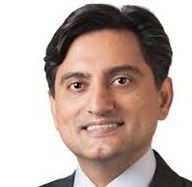- Case-Based Roundtable
- General Dermatology
- Eczema
- Chronic Hand Eczema
- Alopecia
- Aesthetics
- Vitiligo
- COVID-19
- Actinic Keratosis
- Precision Medicine and Biologics
- Rare Disease
- Wound Care
- Rosacea
- Psoriasis
- Psoriatic Arthritis
- Atopic Dermatitis
- Melasma
- NP and PA
- Skin Cancer
- Hidradenitis Suppurativa
- Drug Watch
- Pigmentary Disorders
- Acne
- Pediatric Dermatology
- Practice Management
- Prurigo Nodularis
- Buy-and-Bill
Article
An advocate for change
Author(s):
A conversation with ASDS president-elect Murad Alam, M.D.
Dermatologist Murad Alam, M.D., thinks - and then he acts.

A conversation with ASDS president-elect Murad Alam, M.D.
As chief of cutaneous and aesthetic surgery in dermatology at Northwestern University Feinberg School of Medicine, Chicago, Dr. Alam thinks about how to improve patient outcomes, reduce intraoperative pain, and improve overall patient experience, but he also worries about the rising tide of bureaucracy that leads to physician burnout.
Dr. Alam’s contemplative ways go back to his childhood. Born in Pakistan, Dr. Alam and his family moved frequently due to his father’s work. From Pakistan, the family moved to Istanbul; then to Nigeria, New York City, Rome and Nairobi, where Dr. Alam f nished high school.
A dermatologic surgeon for 21 years, Dr. Alam left Kenya to pursue his medical degree at Yale University, an internship at the University of Michigan, residency at Columbia University and fellowships laser and cosmetic surgery in Boston; plus, a third in Mohs micrographic surgery in Houston.
The travels taught him to adapt and see below the surface, he says.
“I’ve learned that people - wherever they are and despite our superficial differences - are similar in many more ways than they are different.
They want their children to succeed and their families to be happy. They want meaningful work and they want to live in peace,” Dr. Alam says.
CALLING FOR ADVOCACY
That point of view helps the soft-spoken thinker to communicate when advocating for the specialty and its patients. As president-elect of the American Society for Dermatologic Surgery (ASDS), Dr. Alam addresses hot-button issues that threaten affordable quality care.
It’s crucial for dermatologists to consistently engage with regulators and legislators who may need clarity on technical issues or patient concerns in an honest and objective way.
“Our primary goal is what is best for patients. We’re really trying to provide regulators with the information they need to make decisions they’re empowered to make,” he says.
Among those issues includes the onerous requirements of the Centers for Medicare and Medicaid Services for physician reimbursements.
“Most of us feel that a lot of these activities are taking our time, exhausting us and, yet, are not helping take care of the patient,” Dr. Alam says.
He hopes more dermatologists will become politically active, donate to SkinPAC and their legislators, and even consider running for public office. “We need to be heard or we risk being forgotten and our patients overlooked,” he says.
He travels to Washington D.C. frequently to address issues that include narrow networks, which Dr. Alam says is an obstacle for access to needed specialists and subspecialists; truth in advertising, to prevent providers who are not dermatologists from giving consumers the perception that they are; and nurse practitioners and physician assistants practicing without the oversight of a dermatologist.
Dr. Alam is also trying to right a wrong he sees in compounding regulation, which puts strict limits on how drugs are handled. The FDA’s interpretation of the legislation has restricted what doctors can do within their offices, including in-office preparation of drugs, such as diluting fillers with water to achieve different concentrations or mixing lidocaine with bicarbonate so it doesn’t sting on injection.
“These are very safe processes that are really not classical compounding. Despite millions of uses over decades, these procedures have never been shown to cause a single patient harm. They are part of the practice of medicine; not part of the practice of pharmacy or compounding,” he says.
RESEARCH
Much of his research has been on how to improve dermatologic research. He recently published a comprehensive review in Lasers in Surgery and Medicine of noninvasive fat reduction technologies, assessing the comparative utility measures of subcutaneous fat.
Earlier in 2017, Dr. Alam was among the authors of a study published in Dermatologic Surgery that evaluates the functionality of older patients presenting for Mohs surgery. He’s grateful and thankful for the specialty he serves.
“No matter how stressful the day or what other worries are on my mind, it is always a pleasure to see patients. When we are kind, caring and spend time with our patients, we give them a gift beyond mere medicine, and we also feel invigorated and at peace with ourselves,” he says.






